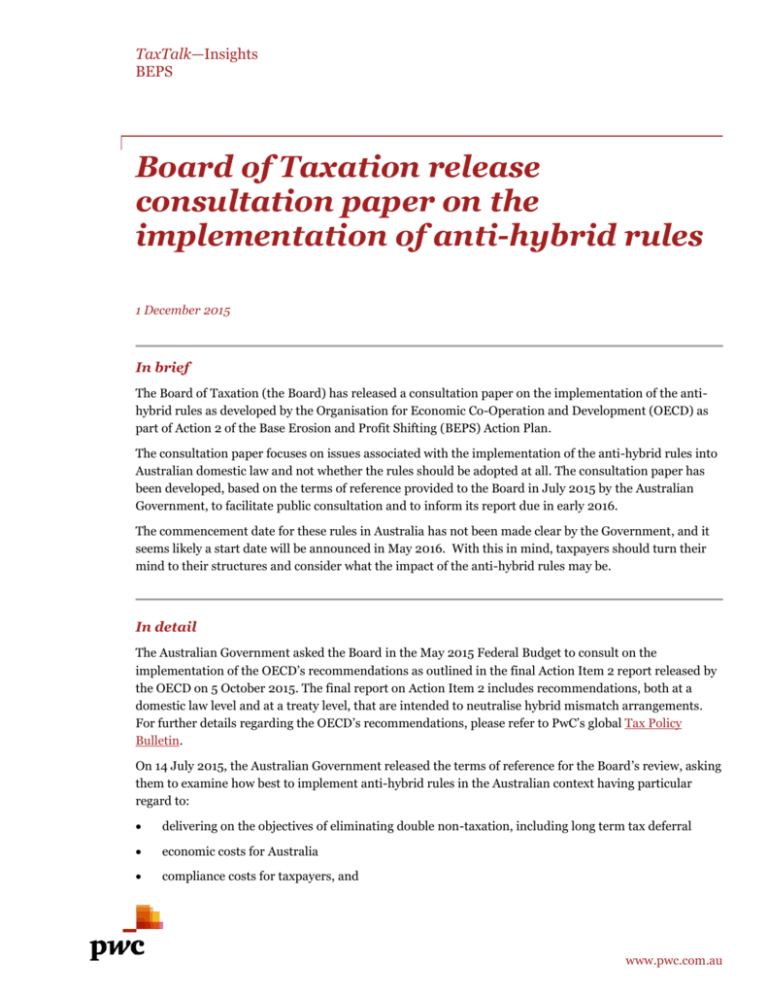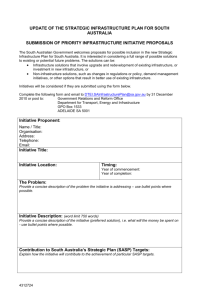
TaxTalk—Insights
BEPS
Board of Taxation release
consultation paper on the
implementation of anti-hybrid rules
1 December 2015
In brief
The Board of Taxation (the Board) has released a consultation paper on the implementation of the antihybrid rules as developed by the Organisation for Economic Co-Operation and Development (OECD) as
part of Action 2 of the Base Erosion and Profit Shifting (BEPS) Action Plan.
The consultation paper focuses on issues associated with the implementation of the anti-hybrid rules into
Australian domestic law and not whether the rules should be adopted at all. The consultation paper has
been developed, based on the terms of reference provided to the Board in July 2015 by the Australian
Government, to facilitate public consultation and to inform its report due in early 2016.
The commencement date for these rules in Australia has not been made clear by the Government, and it
seems likely a start date will be announced in May 2016. With this in mind, taxpayers should turn their
mind to their structures and consider what the impact of the anti-hybrid rules may be.
In detail
The Australian Government asked the Board in the May 2015 Federal Budget to consult on the
implementation of the OECD’s recommendations as outlined in the final Action Item 2 report released by
the OECD on 5 October 2015. The final report on Action Item 2 includes recommendations, both at a
domestic law level and at a treaty level, that are intended to neutralise hybrid mismatch arrangements.
For further details regarding the OECD’s recommendations, please refer to PwC’s global Tax Policy
Bulletin.
On 14 July 2015, the Australian Government released the terms of reference for the Board’s review, asking
them to examine how best to implement anti-hybrid rules in the Australian context having particular
regard to:
delivering on the objectives of eliminating double non-taxation, including long term tax deferral
economic costs for Australia
compliance costs for taxpayers, and
www.pwc.com.au
interactions between Australia's domestic legislation (e.g. the debt-equity rules and regulated capital
requirements for banks), international obligations (including tax treaties) and the new anti-hybrid
rules.
The Board must report back to the Australian Government by March 2016 to allow the issue to be
considered as part of the 2016 Federal Budget (expected to be 10 May 2016).
The Board released its consultation paper on implementation of the anti-hybrid rules as developed by the
OECD on 20 November 2015. Unlike the OECD’s final report, the Board’s consultation paper is a much
shorter document (24 pages) that has been developed to facilitate discussion on how best to implement
these rules into the Australian domestic law and to identify any issues associated with implementation.
The consultation paper does not contain any options nor does it express the Board’s preliminary views as
to how the Australian Government should proceed with these rules. However, it does provide a summary
of the concepts and recommendations in the OECD report and identifies some Australian specific
examples that will likely be caught should the rules be implemented (e.g. US general partnership with
Australian partners, limited partnerships, redeemable preference shares, security lending arrangements).
There are 41 questions in the consultation paper, covering a range of general and specific queries on a
variety of issues. The common themes include:
The costs and benefits of implementing the anti-hybrid rules - e.g. the advantages and
disadvantages (economic, commercial, revenue or other) for Australia in implementing the antihybrid rules.
Interaction with Australian domestic law and other OECD BEPS action items – e.g.
whether there are certain aspects of the anti-hybrid rules that should not be implemented and
whether there are duplication/inconsistencies with Action Items 3 (CFC), 4 (interest limitation) and 6
(treaty abuse) of the OECD’s BEPS Action Plan.
Implementation timing and transitional issues – e.g. possible commencement dates for any
changes , what transitional periods should apply and whether existing arrangements should be
grandfathered.
Technical issues associated with the detailed recommendations relating to financial
instruments, reverse hybrids, dual residency and deductible hybrid payments - e.g.
whether there are particular concerns with adopting each of the recommendations, tracking of dual
inclusion income, definition of ‘reasonable period of time’ , application to branches.
Adoption of an imported mismatch integrity rule – e.g. challenges faced with a rule that relies
on the tracing of funding through multiple jurisdictions and whether an alternative should be
considered.
Integration of OECD definitions into the existing Australian tax law - e.g. whether the
OECD recommended definitions should be adopted for purposes of the anti-hybrid rule or whether
existing definitions in the Australian Tax Law are sufficient (such as the financial instrument and
structured arrangement definitions).
The inclusion of exceptions or carve outs from the anti-hybrid rules – e.g. the possibility of
an exception for intra-group hybrid regulatory capital and regulatory capital issued to third parties by
financial institutions.
Legislative design, compliance and administrative issues – e.g. how to implement the
changes into Australia’s law, practical challenges for taxpayers in identifying arrangements and
complying with the rules.
2
The Board acknowledges in the consultation paper the Australian Government’s commitment to eliminate
tax advantages arising from hybrid arrangements whilst ensuring that investment activity in Australia is
not compromised and that Australia remains an economically competitive place to do business. In our
view, the impact of the anti-hybrid rules on investment activity in Australia is an integral policy question
that will need to be carefully analysed.
The consultation paper notes the importance of implementing the anti-hybrid rules in a harmonised and
consistent manner. Non-uniform adoption could result in double taxation and may impact investment
decisions and so Australia should be careful not to take unilateral action.
The Board has requested submissions by 15 January 2016 to enable it to finalise its report to the
Australian Government by March 2016. In the meantime, the Board have commenced consultation with
stakeholders and will continue to do so over the coming months.
PwC will be preparing a submission to the Board. Please contact us if you would like to contribute to our
submission or would like to discuss the impact of the rules.
The takeaway
Australia is still leading the pack, behind only the UK (expected to release draft rules in early December
2015 with application from 1 January 2017), when it comes to implementation of the OECD anti-hybrid
rules. It is clear that Australia plans to adopt, at least in principle, the recommendations developed by the
OECD.
The commencement date for these rules in Australia has not been made clear by the Government, and it
seems likely a start date will be announced in May 2016.
Let’s talk
For a deeper discussion of how these issues might affect your business, please contact:
Peter Collins, Melbourne
+61 (3) 8603 6247
peter.collins@au.pwc.com
Neil Fuller, Sydney
+61 (2) 8266 2025
neil.fuller@au.pwc.com
Matthew Budge, Perth
+61 (8) 9238 3382
matthew.budge@au.pwc.com
Robert Hines, Sydney
+61 (2) 8266 0281
robert.hines@au.pwc.com
Stuart Landsberg, Brisbane
+61 (7) 3257 5136
stuart.landsberg@au.pwc.com
Michael Taylor, Melbourne
+61 (3) 8603 4091
michael.taylor@au.pwc.com
© 2015 PricewaterhouseCoopers. All rights reserved. In this document, “PwC” refers to PricewaterhouseCoopers a partnership
formed in Australia, which is a member firm of PricewaterhouseCoopers International Limited, each member firm of which is a
separate legal entity. This publication is a general summary. It is not legal or tax advice. Readers should not act on the basis of this
publication before obtaining professional advice. PricewaterhouseCoopers is not licensed to provide financial product advice under
the Corporations Act 2001 (Cth). Taxation is only one of the matters that you need to consider when making a decision on a
financial product. You should consider taking advice from the holder of an Australian Financial Services License before making a
decision on a financial product.
Liability limited by a scheme approved under Professional Standards Legislation.
3








